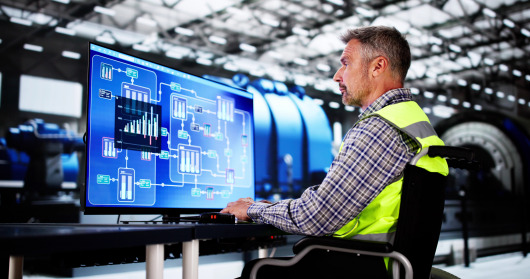
What Makes a Great Controls Engineer: Skills and Qualities You Need to Succeed

The field of controls engineering is experiencing rapid growth as one of the leading engineering disciplines today. These professionals design and manage systems that keep everything running smoothly. Controls engineers work in manufacturing plants and power grids to ensure complex systems function exactly as intended.
What sets excellent controls engineers apart from outstanding ones? The combination of technical skills, soft skills, and personal qualities defines the answer. The following discussion explores the essential elements needed for success in this challenging profession.
The Foundation: Education and Technical Knowledge
Most controls engineers start their careers with a solid educational background. The typical educational requirement for controls engineers includes a bachelor’s degree in electrical engineering, mechanical engineering, or controls engineering. Candidates aiming for senior roles or specialized applications need to hold advanced degrees, depending on the position.
The understanding of mathematics and physics among controls engineers proves to be more important than many realize. Controls engineers perform complex mathematical calculations in their daily work. They use modeling techniques to predict system behavior and optimize performance results. The job becomes considerably more difficult when analytical skills are weak.
Programming skills are also essential. Modern controls engineers need proficiency in programming languages such as Python, C++, and MATLAB. These tools enable engineers to develop algorithms, simulate systems, and solve problems, marking the end of the era where mechanical controls were the sole control method.
Core Technical Skills That Matter
PLC programming is central to controls engineering. Programmable Logic Controllers serve as the main controllers for industrial automation systems. Skilled controls engineers are proficient with platforms including Siemens, Allen-Bradley, and Rockwell. Their expertise involves developing efficient code, debugging complex programs, and optimizing system performance.
HMI development is equally crucial. Human Machine Interfaces allow operators to interact with automated systems. The interface design process by controls engineers focuses on creating systems that are both user-friendly and effective. Engineers balance system complexity with usability to ensure operators have effective monitoring and control capabilities.
System integration separates good engineers from great ones. Modern industrial systems consist of various components that come from different manufacturing companies. Excellent controls engineers demonstrate the ability to integrate these different system components into a unified operating system. They know communication protocols, data formats, and networking requirements.
Troubleshooting skills are absolutely essential. The role of controls engineers during system failures is to identify problems quickly. In urgent situations, they assess symptoms first before testing theories to find solutions. Great engineers can recognize patterns, which helps prevent future problems from happening.
Software Proficiency Requirements
The industry standards for system modeling and simulation are MATLAB and Simulink. Controls engineers use these tools to test designs before implementation. These tools enable the prediction of system behavior across various conditions. The process reduces both time consumption and the cost of errors.
The importance of CAD software knowledge continues to grow. Controls engineers perform control panel design work, select components, and create installation drawings. The engineer must understand both mechanical limitations and electrical specifications.
Data analysis tools are becoming increasingly important. Modern control systems produce large amounts of data. Skilled controls engineers can extract valuable insights from this information. The engineer uses data analysis to identify patterns while improving operational performance and predicting equipment maintenance needs.
The Human Side: Soft Skills That Count
Communication may be the most undervalued skill in control engineering. These professionals work with diverse teams, including operators, maintenance staff, and management. They must explain complex technical concepts in simple terms. Clear communication prevents misunderstandings and ensures project success.
Problem-solving extends beyond technical troubleshooting. Great controls engineers approach problems with innovative thinking. They evaluate different solutions while considering various trade-offs. They can adapt when original plans don’t work out.
Attention to detail is essential in this field. Even small programming errors can lead to significant system failures. Safety systems must function flawlessly every time. Skilled controls engineers always double-check their work and adhere to established procedures.
Project management skills become more important as engineers advance. They collaborate with different departments to manage timelines and control budgets. Project management principles enable them to deliver results on schedule.
Industry-Specific Knowledge Areas
Expertise in safety systems is essential across all industries. Controls engineers must understand safety standards, including OSHA and NFPA. The systems they design are meant to protect both people and equipment. This knowledge is not optional but a legal and ethical requirement.
Regulatory compliance varies across industries but impacts everyone. The FDA provides guidelines that pharmaceutical companies must follow. Food processing facilities are required to meet all standards set by the USDA. Skilled controls engineers stay updated on relevant regulations.
Process understanding distinguishes specialists from generalists. The most effective controls engineers have a thorough understanding of the processes they manage. A chemical plant engineer knows reaction kinetics. A power plant engineer understands thermodynamics. This knowledge base allows them to develop optimal control strategies.
Emerging Skills for the Future
Cybersecurity awareness is becoming essential. Industrial control systems face increasing cyber threats. Controls engineers must understand security principles and implement protective measures. They need to balance accessibility with protection.
Data analytics and machine learning are changing the field. Modern control systems can learn from historical data and optimize themselves. Great controls engineers understand these concepts and can implement them effectively.
Cloud integration is another growing area. Many companies want to monitor systems remotely and analyze data in the cloud. Controls engineers need to understand cloud platforms and security implications.
Personal Qualities of Successful Controls Engineers
Curiosity drives continuous learning in this rapidly evolving field. Technology changes constantly. New products, standards, and methods emerge regularly. Great controls engineers stay curious and keep learning throughout their careers.
Patience is essential when debugging complex systems. Problems aren’t always obvious. Solutions might take hours or days to develop. Rushing leads to mistakes and overlooked issues.
Adaptability helps engineers handle changing requirements. Projects evolve as they progress. New constraints emerge. Great controls engineers adjust their approaches while maintaining quality standards.
Stress management is crucial in high-pressure situations. When production lines stop, every minute costs money. Controls engineers must think clearly under pressure and make good decisions quickly.
Building Your Controls Engineering Career
Start by mastering the core principles. Get thorough training in PLC programming along with HMI development. Practice on various platforms to increase versatility. Many manufacturers provide training programs and certifications.
Gain practical experience whenever possible. Entry-level jobs, internships, and co-op programs act as vital learning opportunities for new professionals. Real-world experience provides lessons that textbooks cannot.
Build professional connections with others in your field. Join organizations like the International Society of Automation (ISA). Attend conferences and training sessions. Developing professional relationships opens up new career opportunities.
Specialize in specific industries or technological areas to improve your career opportunities. Expertise in pharmaceutical automation or renewable energy systems will increase your professional value and earning potential.
Salary Expectations and Career Growth
The compensation for Controls engineers remains competitive. The starting salaries for entry-level positions range between $65,000 and $85,000 per year. Engineers with mid-level experience earn between $85,000 and $106,000 annually. Senior engineers and specialists earn salaries exceeding $150,000.
There are many career growth opportunities for engineers. They can advance by taking on senior technical roles, becoming project managers, or moving into engineering management. Some engineers start their own consulting businesses, while others work as system integrators.
The job market shows strong prospects because the projected growth rate is 3% over the next decade. Industrial automation continues expanding its presence across every industrial sector. Organizations need qualified personnel to develop, operate, and maintain these systems.
Common Career Paths and Specializations
Specialization in specific industries is common for controls engineers. Manufacturing automation offers stable employment opportunities with various challenges. The process industries, which include chemicals and pharmaceuticals, require specialized knowledge. Operating power generation and distribution systems demands expertise in electrical systems.
Some engineers concentrate on specific technologies. The field of motion control specialists includes robotics and precision positioning systems. Safety system experts design protective systems. Network specialists manage industrial communication systems.
Consulting offers another career path. Experienced engineers can work independently or with consulting firms. Engineers who solve problems for various clients gain knowledge about multiple industries and technological systems.
Your Next Steps Forward
The field of controls engineering offers exciting career opportunities with strong growth prospects. It combines complex technical challenges with practical problem-solving skills. Great controls engineers make significant improvements in business operations and enhance competitive advantage.
To achieve success, one must stay committed to continuous learning. Engineers need to keep up with technological advancements because they change rapidly. The investment of skills by motivated professionals results in significant professional rewards.
All industries are showing a growing need for trained controls engineers. Organizations are seeking professionals who can design efficient systems, solve complex problems, and adapt to changing requirements.
Developing these skills and qualities will set you apart from others, whether you’re just starting your career or aiming for advancement. Focus on building both technical skills and soft skills. Stay curious, continue learning, and welcome new challenges.
Are you ready to advance your controls engineering career? Hunter Recruiting connects talented controls engineers with top companies across industries. Our recruiters understand what makes controls engineers succeed, based on their skills and qualifications. We help both new and experienced professionals find job opportunities matching their goals and abilities. Hunter Recruiting is here to help you find your next controls engineering position and support your growth in this field.













